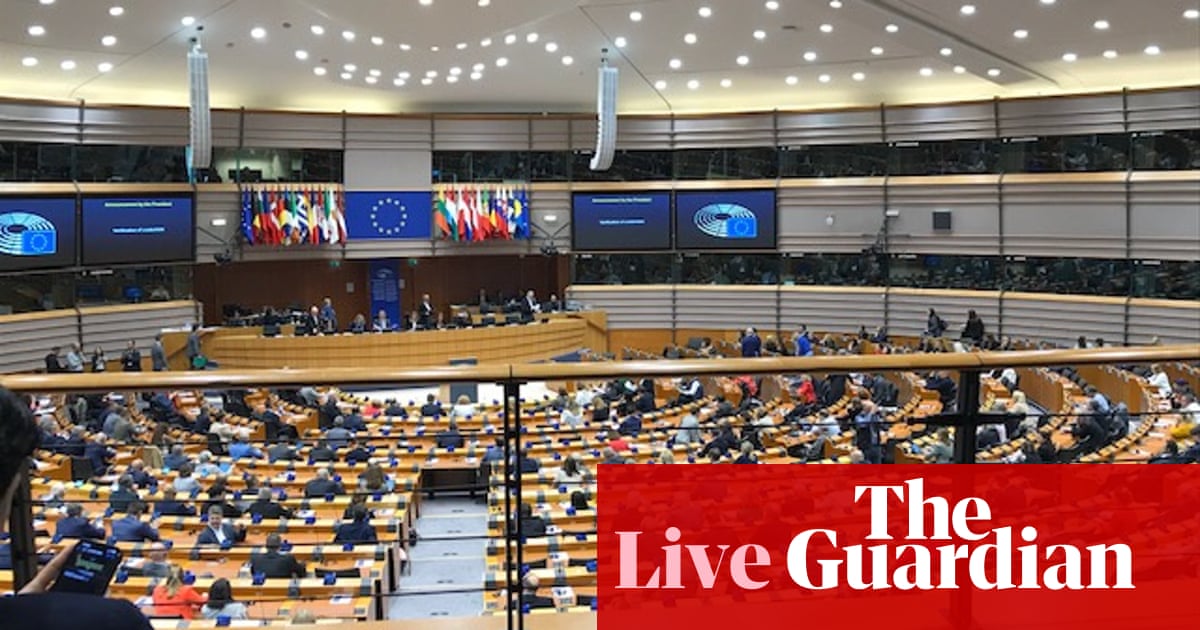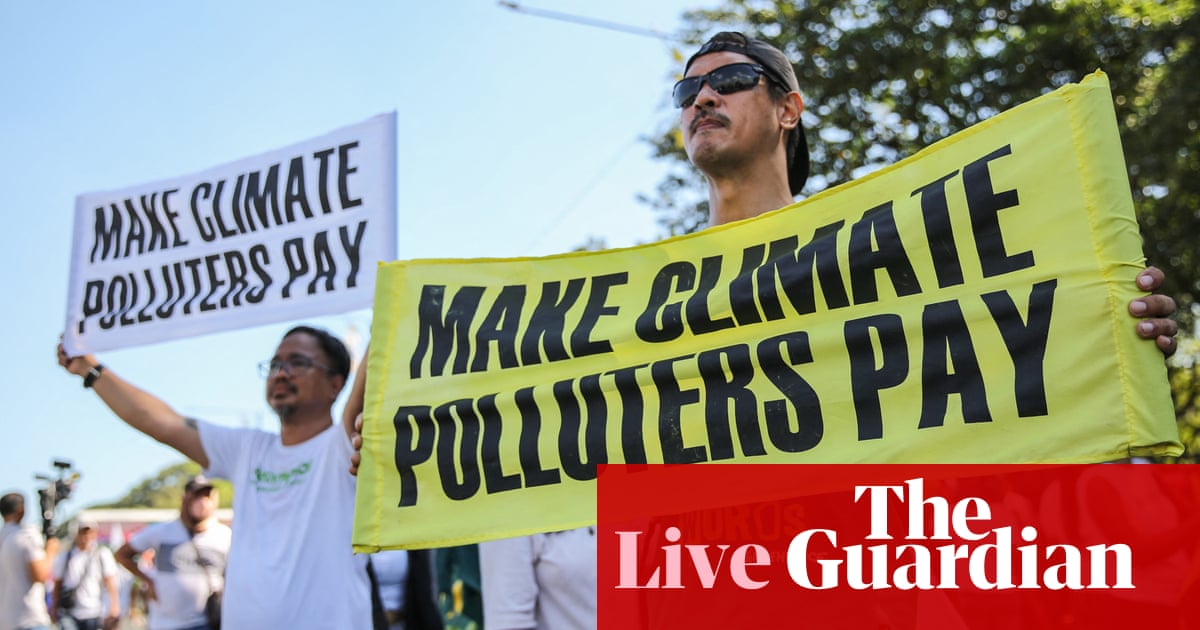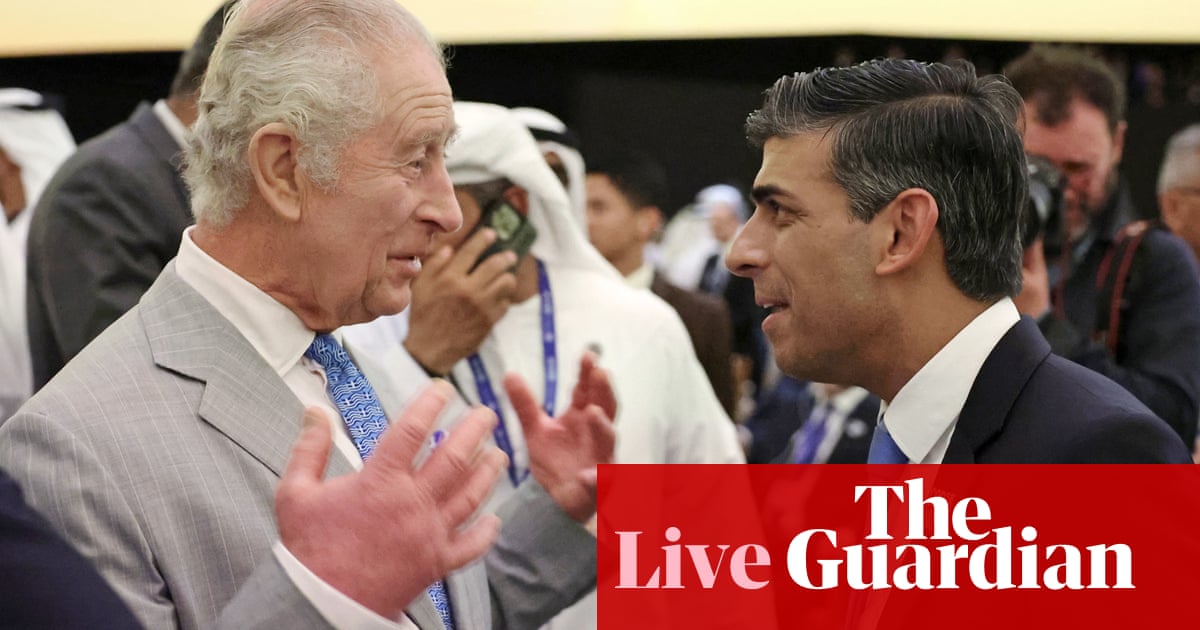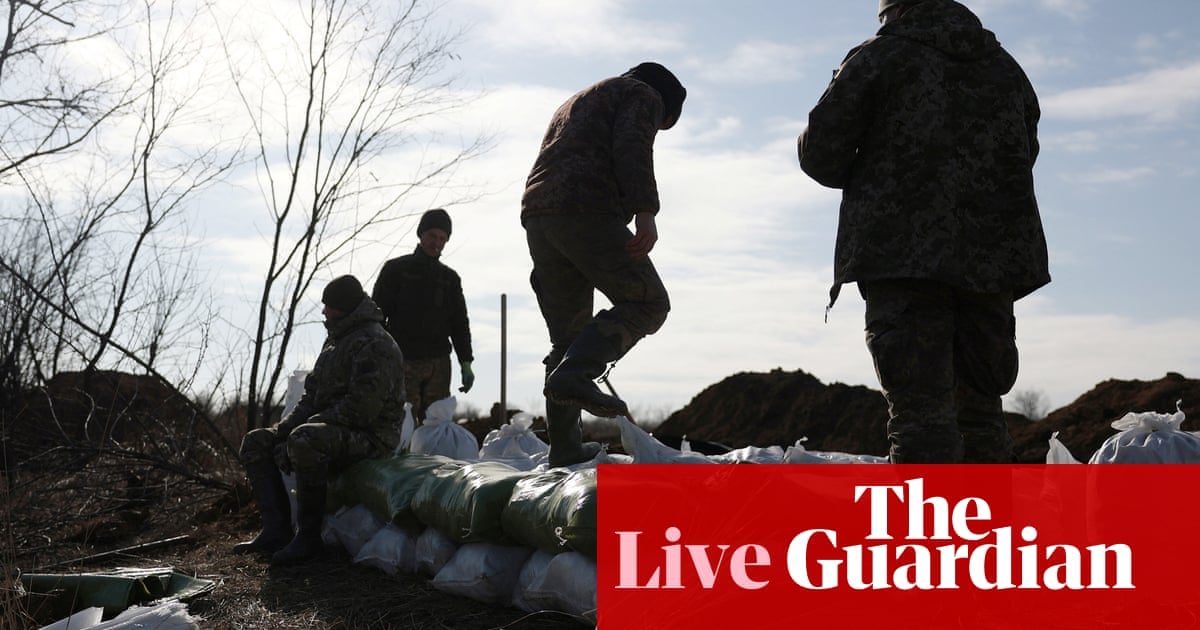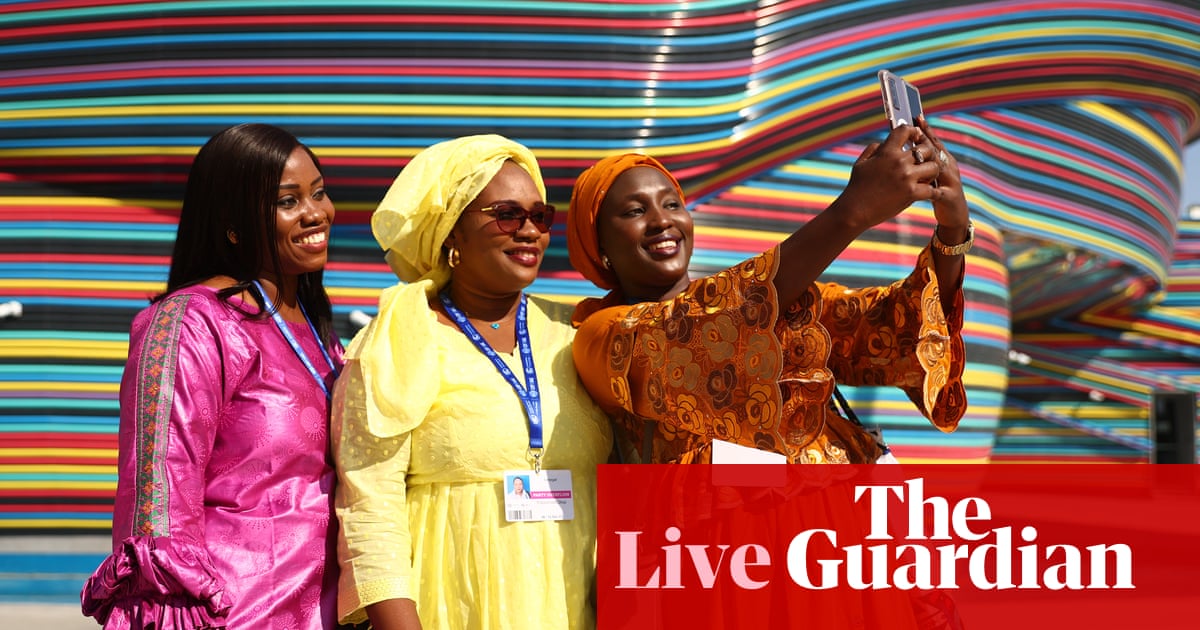
Sultan Al Jaber says Cop28 "has already made history" at start of second week
Hello! Helena Horton here taking you through the summit for the rest of the day.
Sultan Al Jaber just held a press conference to kick off week two of Cop28 after a rest day. He told the audience: “I do hope you managed to get some rest yesterday and I hope you are ready for what will be a momentous few days ahead.”
The Cop28 president and oil executive will is likely to be hoping this second half of the summit goes better than the last, when his presidency was undermined by his remarks to Mary Robinson, the former president of Ireland, in which he questioned the science around the phase out of fossil fuels.
He spoke on this theme, insisting this Cop under his leadership is better and more successful than previous summits.
“We can all agree Cop28 has been different, and I am sure we will agree that Cop28 has already made history. There is a unique sense of momentum, a sense of inclusivity and a sense of willingness and flexibility. I also feel a sense that something unprecedented is possible to happen here at Cop28. We achieved consensus on the first day with the loss and damage, and I believe with the momentum we have, with the action-oriented mindset that has been instilled across the board here on the site, I believe we can achieve consensus again on the rest of the agenda.”
Summary
That’s it from us for today, as the second week of Cop ramps up and we begin to see the tussles over the language – will we phase out fossil fuels, what does abatement look like, and what does that all mean for the Paris agreement?
We will be blogging and reporting all weekend, and indeed until the negotiations end, whenever that may be, so stay tuned. In the meantime, here’s what happened today.
The former French prime minister and Cop21 president, Laurent Fabius, said we are off track for 1.5 degrees of warming, as agreed in the Paris agreement, and that he thinks we will hit between 2.8 and 3 if we don’t act now.
Nina Lakhani revealed Cop28 organisers granted attendance to at least 475 lobbyists working on carbon capture and storage, unproven technologies that climate scientists say will not curtail global heating.
Norway’s minister of foreign affairs, Espen Barth Eide, was confronted by activists protesting against the new Rosebank oilfield in the North Sea. The oil and gas licence has been signed off by the UK government – which has been highly controversial – but the facility will be operated by Norway’s Equinor. They asked him if he would stop Rosebank because of the vast emissions it would cause. He said it was not up to him, adding: “These decisions are up to the UK government.”
Sultan Al Jaber, Cop28 president, seemed chipper about the progress made at the summit. He told journalists “We can all agree Cop28 has been different, and I am sure we will agree that Cop28 has already made history.”
Laurent Fabius: "We are off track for 1.5C"
The former French prime minister and Cop21 president has had a chat with our environment reporter after his press conference.
When she asked him if he thought we were on track to meet the 1.5C target agreed in Paris, he was pessimistic. “Are we so far away from 1.5C? The figures aren’t that good. And all the scientific data shows that we’re off track. Remember that before Paris? The tendency was four degrees. Sure. Now, it’s something between 2.8 and three and we have to be 1.5 which means to act urgently, not in 20 years. Right now.”
She then asked him if the Paris agreement would fail if we do not get a phase-out of fossil fuels.
He said: “I hope that we will find something which will be meaningful, because I compare it with the elephant, you can say the elephant is not here – it is here.” He seems to be saying it is the elephant in the room when it comes to meeting the 1.5C target.
Fabius added: “And therefore, we have to deal with that, obviously in a realistic manner, but from my different talks, and particularly with the president of this Cop … my own belief is that we have to be very clear that … both companies, governments and all the people that have to know that they have progressively to replace the fossil fuel with renewables, not only renewables, other obviously, techniques, but we have to insist on that. And it will be part and parcel of the success of the whole of this Cop.”
Here is some more of my terrible French translation – do take with a pinch of salt – I am doing my best until we get someone who is better at French than me to chime in … the translation service for this press conference is not working.
Laurent Fabius continues at the press conference, he said the phase-out has to be interconnected with a just transition and this includes funding as well as all the required technology and industry for developing countries.
He is now saying that the Cop process is all about trust. He smiled and said that Al Jaber is very nice and diplomatic but that without trust, the final text cannot be successfully completed. He repeated his comment about trust a fair few times. He said it’s hard to critique how the current president is doing because it’s a very different time compared with when he chaired Cop21.
He gave some advice to Al Jaber, who he referred to as his friend: “You need ambition while being realistic”.
I’ve just been sent in some analysis from Friederike Röder, Vice President Policy and Advocacy, Global Citizen about the latest GST draft. She does not seem very optimistic and says we are “going in reverse” on some issues.
The latest GST draft shows one thing : there is still a lot of work to be done to ensure a historic success at COP28. For that, two issues are critical: the phase out of fossil fuels and meaningful language on climate finance going forward.
New options are on the table for the phase out of fossil fuels - showing that this remains a key question which cannot just be swept under the rug. The mention of the need to align with Paris as well as setting a timeline (well before 2050) are all pointing into the right direction of what the final outcome should look like: agreement on a phase-out of fossil fuels (not unabated only), with a view to a peak in their consumption in this decade and underlining the importance for the energy sector to be predominantly free of fossil fuels well ahead of 2050.
The fossil fuel subsidies language is weakened, limiting phase out to subsidies that do not address energy poverty, and still without any timeline. How is it possible that we’re going in reverse on 2009 language?
While the language on international climate finance has not changed substantially, the call to encourage parties to scale up climate finance has disappeared from one of the options (97.2). While it’s good that there is recognition of the shortfall to the USD 100B target (including for past years) and that there is an expectation that it will be met in 2022, these words mean nothing without plans on how the goal will be met through 2025 and with verifiable data on 2022.
Laurent Fabius, the former French prime minister and chair of Cop21, which was viewed as a successful summit, has been giving his tips on how Cop28 can succeed during a press conference.
My French isn’t good enough for a proper translation (I will get one to you!) but he has been drawing on his experience as a negotiator, praised what has gone on so far with loss and damage funding, and been broadly positive about Al Jaber’s work so far as Cop28 president.
Here’s Greta Thunberg at a Cop-themed climate strike. She said: “We need the fossil fuel lobbyists out of climate negotiations, and no more empty promises.”
Here is some commentary on the UK’s backing of the fossil fuel phase-out language at Cop28 from ActionAid. The charity thinks the government is not practising what it preaches, as Britain continues to expand fossil fuel production.
Zahra Hdidou, a senior climate and resilience adviser at ActionAid UK, said:
“While the UK government publicly backs the phasing out of fossil fuels at Cop, its commitments aren’t worth the paper they’re written on. The promise to phase out fossil fuels while issuing a hundred new oil and gas licenses is an outrageous contradiction and one that will plunge the most marginalised communities well past the brink of climate catastrophe.
“In backing the phase-out of only ‘unabated fossil fuels,’ the UK is trying to pull the wool over the eyes of climate-affected communities and provide cover for oil and gas companies to wreck the planet for decades to come.
“The text today offers an opportunity to genuinely phase out all fossil fuels in line with the Paris agreement – a moment the UK should seize with both hands.”
At least 475 carbon-capture lobbyists attending Cop28
Nina Lakhani
Cop28 organisers granted attendance to at least 475 lobbyists working on carbon capture and storage (CCS), unproven technologies that climate scientists say will not curtail global heating, the Guardian can reveal.
The figure was calculated by the Centre for Environmental Law (Ciel) and shared exclusively with the Guardian, and is the first attempt to monitor the growing influence of the CCS subset of the fossil fuel industry within the UN climate talks.
CCS, or CCUS (which includes “utilisation”) is being pushed hard at the summit by fossil fuel and other high-pollution industries, as well as by the biggest greenhouse gas emitting countries. CCS backers say the technologies will enable polluters to trap carbon dioxide emissions and bury them under the ground or the seabed, or use the CO2 in the production of fuels or fertilisers.
The Intergovernmental Panel on Climate Change and other climate scientists agree that phasing out oil, gas and coal is the only path to curtailing global heating to somewhere near 1.5C above pre-industrial levels, and that CCUS and other unproven niche technologies are a delaying tactic and a distraction that could, at best, contribute to a very limited extent.
Lili Fuhr, the director of Ciel’s fossil economy programme, said: “The force with which the fossil fuel industry and their allies are coming to Dubai to sell the idea that we can ‘capture’ or ‘manage’ their carbon pollution is a sign of their desperation. CCS is the fossil fuel industry’s lifeline and it is also their latest excuse and delay tactic.
“We must not let an army of carbon capture lobbyists blow a gigantic loophole into the energy package here at Cop28.”
Dr Simon Evans at CarbonBrief has the latest on the new text on global stocktake:
The next few days could be the world’s last chance of keeping global heating within safe limits, leaders at the Cop28 UN climate summit have been told.
Talks in Dubai are entering their final phase, with governments still far apart on the central question of whether to phase out fossil fuels.
Dan Jørgensen, Denmark’s climate minister, who has been charged with one of the key roles in forging an agreement among deeply divided governments, said: “We cannot negotiate with nature. The climate cannot compromise. No well meaning words will change a single thing unless we act. This week may be our last opportunity to bring us on course to keeping 1.5C alive.”
Jørgensen, along with the South African minister Barbara Creecy, will chair negotiations on the global stocktake, a process under the 2015 Paris climate agreement that assesses progress – or lack of it – towards meeting the treaty’s goals of holding global temperature rises well below 2C and “pursuing efforts” to keep them to 1.5C above pre-industrial levels.
"That"s up to the UK" – Norway"s minister confronted on Rosebank oilfield
Norway’s minister of foreign affairs, Espen Barth Eide, has been confronted by activists protesting against the new Rosebank oilfield in the North Sea. The oil and gas licence has been signed off by the UK government – which has been highly controversial – but the facility will be operated by Norway’s Equinor.
They asked him if he would stop Rosebank because of the vast emissions it would cause. He said it was not up to him, adding: “These decisions are up to the UK government.”
When it was pointed out the Norwegian government had power over the state-owned companies such as Equinor, he said: “Yes, but they are operating in the marketplace … we are trying to phase out the use of fossil fuels” – before walking away from the activist.
Nina Lakhani
In the ministerial pairings announced this morning, Egypt and Canada have been tasked with helping the UAE presidency come up with a negotiated text on implementation – which is fundamentally about climate finance.
Mohamed Nasr, Egypt’s chief climate negotiator who helped drive the loss and damage victory at Cop27, told the Guardian: “We are aware of the challenges developing countries are facing in meeting the current NDCs [Nationally Determined Contributions] and national climate action plans – to cut emissions and adapt to climate impacts. Without this we don’t have anything. If developing countries do not have access to appropriate finance, loss and damage will rise, development will slide, migration will increase. Climate policy and climate finance cannot work in a silo.”
NDCs are at the heart of the Paris agreement and the achievement of its long-term goals to cut emissions and adapt to climate impacts. Each country is required to establish an NDC and update it every five years.
Developed countries have failed to meet their climate finance obligations, generating an ever rising gap between what developing countries need for mitigation and climate adaptation, and what’s available to them.
Canada, which has an extractive industry economy, will likely be pushing to limit grants and further increase the role of private sector finance in climate action – which is what many developed countries favour.
Five climate experts explain the difference between 1.5C and 2C
The world’s most ambitious climate target is under threat from physics and politics. But what would it mean for the planet and its inhabitants if humanity were to abandon the goal to limit global heating to 1.5C above pre-industrial levels?
The inclusion of 1.5C (2.7F) was hailed as one of the great triumphs of the Paris climate agreement of 2015. Until then, international ambition had been limited to 2C, much to the frustration of small island states and others on the frontline of climate disruption.
So what’s the difference? Five climate scientists explain. Read below
The Australian mining billionaire Andrew Forrest has been in Dubai since Cop28 kicked off, condemning the evils of the oil and gas industry and stressing the need for countries to back strong language saying fossil fuels will be phased out.
He has paid for ads in more than 10 newspapers around the world, including the New York Times, Wall Street Journal, Washington Post, Financial Times in the UK and the Times of India, to reinforce this point.
Under the banner of Forrest’s company, Fortescue, the ads show an ostrich with its head in the sand. Above the bird runs the text: “Oil and gas, here is the science you’ve missed.”
Forrest, known in Australia as Twiggy, is the country’s second richest person, with a net worth of A$33.3bn (£17.4bn). Though he made his fortune mining iron ore and selling it to China to make steel, he has more recently become an aggressive renewable energy investor and advocate.
Forrest told the Guardian that Cop28 could have “enormous historic relevancy” if countries declared fossil fuels would be phased out, and not just “abated” through what he called the “old lie” of carbon sequestration. He said it would be a “flop” if leaders failed to agree on this point.
“The science is now cutting through, and if people are saying they don’t know it, or they ignore it, then I do think they have blood on their hands,” he said.
A historic deal on loss and damage was struck at Cop28 last week – but aid organisations are warning that similar urgency needs to be enacted on climate adaptation.
A recent report said finance for adaptation needed to reach US$194bn$366bn a year. Yet recent evidence shows adaptation funding fell 15% in 2021 from the previous year, to US$24.6bn.
Mary Friel, a senior climate officer at the International Federation of Red Cross and Red Crescent Societies (IFRC), said:
“As we enter week two of Cop, adaptation – essential to saving lives – falls behind. Limited progress on a new global goal and slow action to deliver on the doubling of adaptation finance, as agreed in Glasgow two years ago, is deeply worrying. It puts the success of this Cop in doubt.
“The historic progress on loss and damage, which began this Cop, was a notable success. But not moving forward on adaptation would be a major failure.”
Kirsten Hagon, IFRC’s head of global policy and diplomacy, added:
“Extreme weather and climate related events don’t have to lead to disasters, but they will if we fail to invest in adaptation. The urgency felt by communities facing rising sea levels, droughts, floods or heatwaves is missing in the negotiation rooms on the adaptation agenda. It’s time to set aside disagreements and focus on positive action desperately needed for people and communities to protect their livelihoods, save lives and prevent loss and damage.”
He took some questions from journalists.
Agence France-Presse asked if there would be language on coal, oil and gas in the final text of Cop. Sultan Al Jaber, the summit’s president, responded that keeping 1.5 in reach was his “North star” and added: “My job is to keep that North star shining every step of the way.” He said the decision was for those negotiating, and it was his job to “enable and facilitate the process”. Al Jaber added the energy transition must be “pragmatic and results-delivered”. So no real answer on that.
The BBC asked how Al Jaber would bring on board those countries reluctant on the issue of fossil fuels, including China, Russia and Saudi Arabia. He said: “I have been engaging with everyone on all parties” including “businesses and industry”. The Cop28 president added: “I did not leave any stone unturned for my commitment for the highest possible ambition ever coming out of a Cop.”
The South African Broadcasting Corporation asked about financing for developing countries, saying they will not be able to repay back loans from developed countries. Al Jaber replied: “We cannot only view climate change as a burden, a problem or a challenge. We have to turn that narrative and claim it as an opportunity – it can be seen as a new industrial revolution. Finance must be made available, accessible and affordable, not only by making pledges but by ensuring that the mechanisms that will allow for those who need it are easy for them to tap into, and ensure the delivery of this money on a timely basis.”
Sultan Al Jaber says Cop28 "has already made history" at start of second week
Hello! Helena Horton here taking you through the summit for the rest of the day.
Sultan Al Jaber just held a press conference to kick off week two of Cop28 after a rest day. He told the audience: “I do hope you managed to get some rest yesterday and I hope you are ready for what will be a momentous few days ahead.”
The Cop28 president and oil executive will is likely to be hoping this second half of the summit goes better than the last, when his presidency was undermined by his remarks to Mary Robinson, the former president of Ireland, in which he questioned the science around the phase out of fossil fuels.
He spoke on this theme, insisting this Cop under his leadership is better and more successful than previous summits.
“We can all agree Cop28 has been different, and I am sure we will agree that Cop28 has already made history. There is a unique sense of momentum, a sense of inclusivity and a sense of willingness and flexibility. I also feel a sense that something unprecedented is possible to happen here at Cop28. We achieved consensus on the first day with the loss and damage, and I believe with the momentum we have, with the action-oriented mindset that has been instilled across the board here on the site, I believe we can achieve consensus again on the rest of the agenda.”





